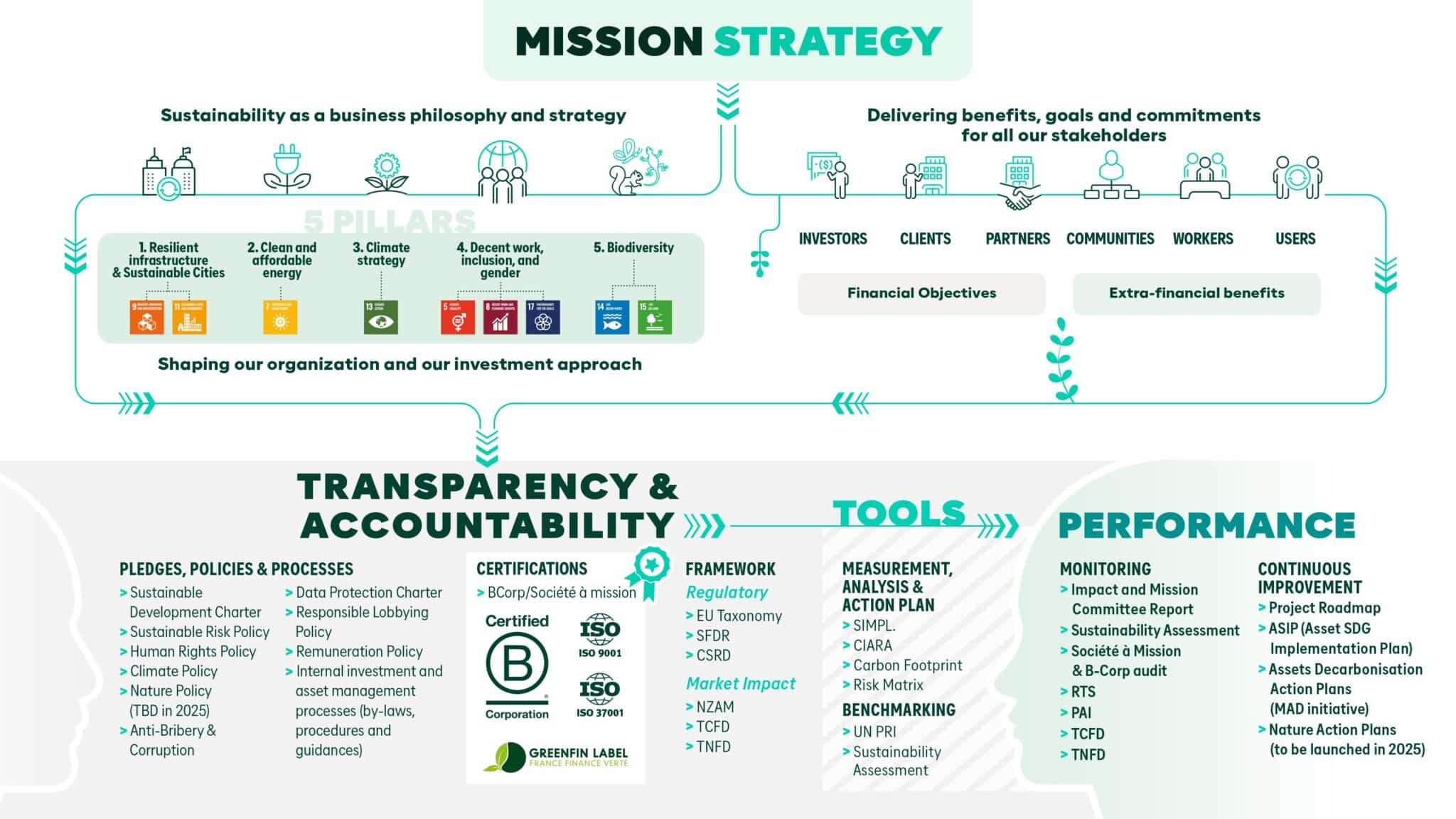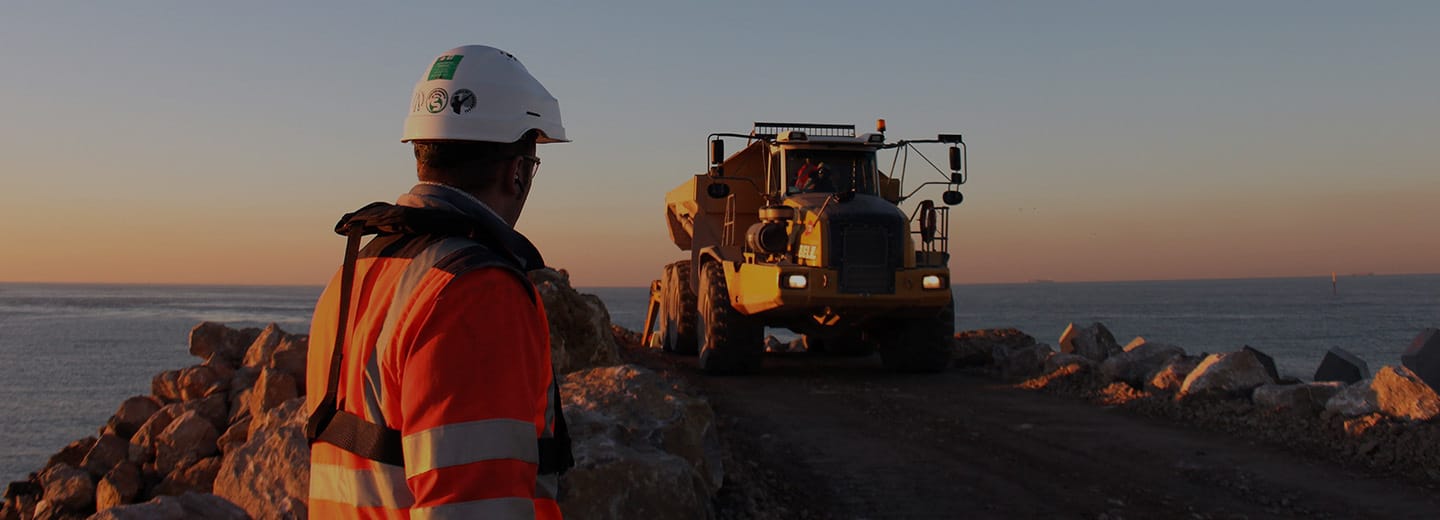Our impact
Investment approach
Meridiam is an independent investment Benefit Corporation and an asset manager, a leading specialist in sustainable greenfield infrastructure globally and in sustainable SMEs.
Sustainability as a business philosophy and strategy
The firm was founded in 2005 on the principle that infrastructure investment should be long-term, responsible, and sustainable, with clear benefits to local communities. And, on the belief that the proper qualification of Environment, Social and Governance (“ESG”) and impact is essential to effective stakeholder management.
Meridiam has since developed robust ESG principles to include not only relevant global standards, such as the UN Principles of Responsible Investment (“UN PRI”) and the Equator Principles, but also to consider the ESG criteria of leading Development Finance Institutions (“DFIs”) (including the European Investment Bank (“EIB”), European Bank for Reconstruction and Development (“EBRD”) and the International Finance Corporation (“IFC”) Standards). These principles form the core of Meridiam’s sustainable development charter and are integrated throughout our investment and portfolio management process.
Our track record
By acquiring the status of certified benefit corporation, Meridiam went further in formalizing its sustainability strategy. Our mission “delivering sustainable infrastructure that improves the quality of people’s lives” is now enshrined in its by-laws, confirming its commitment to achieving the United Nations Sustainable Development Goals (“UN SDGs” or “SDGs”) and a rigorous evaluation of the impact of our investments.
Our five pillars
Our five strategic pillars are:
- ”Deliver resilient infrastructure and develop resilient cities”
- ”Accelerate energy transition”
- ”Avoid & reduce emissions”
- ”Promote good work conditions, inclusion, diversity & gender equality”
- ”Protect & enhance biodiversity”
These pillars shape our organisation and our investment approach. They align with the UN Sustainable Development Goals and with our mission to improve the quality of people’s lives. What stands us apart is our pure focus on creating public infrastructure with a positive economic, social and environmental impact across Europe, Africa and the Americas.
Different countries and regions have a wide variety of social and environmental priorities. And every infrastructure project serves a different purpose – from the provision of quality healthcare to efficient mass transportation, or access to reliable, renewable energy. Each needs an individual approach linked to an overarching strategy.
Our pillars help turn our mission into deliverable goals, enabling us to target our initiatives and measure our firm’s impact on a global basis. They keep our sustainability strategy focused and help us identify ways to further improve our assets and our organisation
Meridiam’s Mission Committee meets at least three times a year to review and discuss Meridiam’s
achievements, challenges, and new initiatives aligned with the Mission Objectives.


Meridiam monitors its CSR performance every two years based on an assessment conducted by a third-party ESG/SDG ratings agency – Moody’s. Since 2020, this assessment is even more comprehensive and covers the whole sustainability approach of Meridiam and how it is implemented in all its activities.
The Sustainability Assessment was first carried out in 2020 and again in 2022 on Meridiam and its portfolios, and covered SDG-orientated topics. In the 2022 Sustainability Assessment, Meridiam obtained a scoring of 65/100 (versus an objective of 70), hence rating “Advanced”*, as was the case in 2020 (see Advanced Sustainability Rating by Moody’s and learn more here).
[*] Recognition was received in December 2022. Members of Moody’s ESG Solutions are required to pay for their application to be analyzed and scored against Moody’s benchmarks.
Finally, in 2018 Meridiam created SIMPL. – the ‘Sustainability Impact Measurement Platform’ – an online platform that tracks and monitors the impact of assets against ESG targets and the United Nations Sustainable Development Goals (UN SDG). The interface is intuitive, easy to use and shows in real time the concrete impact of assets.
This monitoring and management tool is now a Software as a Service (SaaS), commercialized for financial market clients and corporates through an independent company*. Meridiam is now a client of SIMPL. and not the only user of this pioneering impact evaluation solution.
Learn more here!
* joint venture between Meridiam and Blunomy (the specialized consultant with whom the tool has been historically developed).
Our delivery
Over 15-year track record of delivering robust, long-term and sustainable infrastructure
Meridiam invested more than $85 billion to date and currently manages over 125 essential public infrastructure that responds to the critical needs of communities, in three core sectors: sustainable mobility, innovative low carbon solution, critical public services (as of April 2024).
Meridiam raised several funds, with complementary approaches :
- Sustainable and resilient Infrastructure: Meridiam Infrastructure (MI), Meridiam Infrastructure Europe II (MIE II), MIE III, Meridiam Sustainable Infrastructure Europe IV (MSIE IV), Meridiam Transition, Meridiam Infrastructure North America II (MINA II), MINA III, MINA IV, Meridiam Infrastructure Africa Fund (MIAF), MIAF II, The Urban Resilience Fund (TURF), Meridiam Sustainable Water and Waste Fund (MSWWF), managed accounts and co-investments.
- Sustainable SMEs: Green Impact Growth Fund (GIGF)
The portfolio represents in total over $22 billion of Assets Under Management (AUM as of April 2024).
Sustainable Finance Disclosure Regulation (SFDR)
All our new funds (two Successor funds for a total of € 2.8 billion ($3.4 billion), two new products for a total of €440 million (GIGF and TURF addressing respectively fast growing SMEs involved in transition economy and urban resilient infrastructure), and a new dedicated fund: Meridiam Sustainable Waste & Water Fund to acquire the New-Suez) are fully aligned with the firm’s sustainability objectives and qualify as Article 9 under the new EU Sustainable Finance Disclosure Regulation (SFDR), the highest sustainable classification in Europe.
Meridiam demonstrated its ability to control and mitigate risks associated with greenfield assets, in particular:
- Development risks as demonstrated by the Team’s high success rate
- Construction risks, completing projects on time and on budget
- Political risks, engaging all stakeholders of a project, focusing on essential infrastructure that serves a critical need of the local community, and through rigorous management of ESG issues and pro-active engagement with SDGs
- Environmental and social risks, with a rigorous and stringent approach to sustainable investing over the long term.
Our expertise
We have deep development expertise across a stable, experienced and local team.
Meridiam’s team, which comprises 368 people (as at April 2024), has extensive experience in developing and managing infrastructure assets, as well as supporting the scale-up of impactful SMEs.
The majority of senior management and the investment team has a background in engineering. It reflects Meridiam’s investment philosophy of delivering value to its stakeholders primarily through the creation of new and sustainable infrastructure as the key driver of Meridiam’s value creation and portfolio management strategy.
